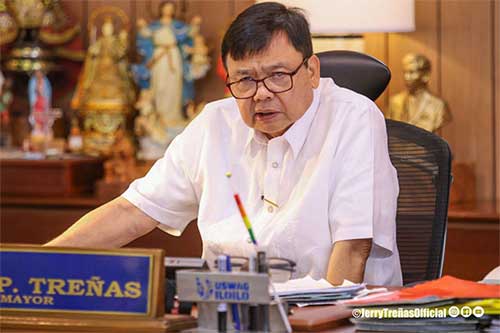By Artchil B. Fernandez
The passing of Francisco “Dodong” Nemenzo marks the end of a period where Marx and Marxism were the cause célèbre of Philippine academia. Dodong Nemenzo was a towering figure of that era.
In his lifetime, Dodong Nemenzo not only toiled to make Marxism comprehensible and locally relevant but tirelessly worked, above all, to make academia an arena where contending ideas, philosophies, ideologies, and thinking flourish and thrive. As a young student then, I was one of the beneficiaries of his effort to transform the academe into a “free, liberal market of ideas, where the best of the Left, the Center, and the Right clash to sway students to their side” (Abinales 2025).
One of Nemenzo’s flagship programs as chancellor of UP Visayas was organizing round-table discussions on burning issues of the day or topics that have an impact on society. Nemenzo personally led these round-table discussions, unpacking and interrogating the topic of the day. I attended these discussions held at his office. More remarkable, I was welcomed to these round-table discussions despite being an outsider, a non-UP student. This is a testament to Nemenzo’s inclusive and non-discriminatory policy and his drive to make UP a true university of the people.
The round-table discussions were lively and energetic, livened by Nemenzo’s sharp wit, incisive analysis, and sparkling sense of humor. There was never a dull moment, which speaks volumes of his quality as a teacher. It was also noteworthy that a university chancellor would apportion his precious time to such activities, underscoring his intellectual commitment and genuine desire for the formation of youth who are conscious, aware, and critical of the issues and problems affecting them and the country. An active and involved youth, for Nemenzo, is the hope of the nation.
Aside from the memorable round-table discussions, two incidents made my interactions with Dodong Nemenzo quite extraordinary, providing a rare glimpse of the kind person that he was.
One time, there was a symposium at the UP Visayas auditorium with Miriam Defensor-Santiago, the rising star of Philippine politics at that time, as speaker. Unaware that there were many non-UP students among the audience, the feisty budding politician praised to high heavens UP students while denigrating the “others.” An embarrassed Dodong Nemenzo, who was seated beside me, profusely apologized. A university chancellor “apologizing” to “outsiders” is unusual. Such a display of humility is only found among genuine intellectuals who are so secure in themselves. It also demonstrated Dodong Nemenzo’s profound humanness, sensitivity, and good-natured personality. Dodong Nemenzo is solid and cool—“No Cap” and “Lit” in Gen Z vocabulary.
On another occasion, I was stranded at the old Iloilo airport due to a strike by traffic controllers on my way to Cebu for a student conference. Dodong Nemenzo was also among the stranded passengers. He invited me to join him at his table at the airport café, and we discussed various topics. It was also an election period, and some national candidates traveling on chartered planes dropped by our table to pay courtesy to the UPV chancellor. Dodong Nemenzo would also introduce me to them like an “old friend.” It was again another surprising gesture, revealing his endearing and engaging side. We parted ways in the middle of the afternoon when a C-130 offered to ferry Cebu passengers.
The last time I saw Dodong Nemenzo was March 2023 at the Fifth Floor Mini Hall of UP Diliman School of Labor and International Relations (SOLAIR) new building. I attended a lecture on “The Indonesian Labor Movement: Class, Nation, and the Forgetting of Development” by Max Lane, PhD. He was already in a wheelchair, yet there he was—a curious and inquisitive intellectual. Dodong Nemenzo remained a committed and true intellectual to the end—the last Marxist in Philippine academia.
As a Marxist scholar, Dodong Nemenzo battled to clear a lot of misconceptions and distortions about Marxism. One of these is the dogmatic accusation. Marx, Nemenzo argued, “never regarded the theoretical system he developed as fixed and complete, as a universal and eternal truth which only had to be learned by rote and applied in mechanical fashion anywhere and at all times” (2010). Throughout his intellectual life, Nemenzo was uncompromising in rooting out dogmatism in Marxism.
Marxism is a dynamic and vibrant theory, which Nemenzo pointed out is “a mode of analysis and useful as a guide to action…a tool in analyzing existing reality” (2010). It is not an immutable doctrine, according to Nemenzo, for “a social theory can only retain its vigor and vitality if it adapts to the varied circumstances and keeps pace with developments in the real world” (2010). Hence, Marxism cannot be dogmatic, Nemenzo asserted. He lamented that many communist parties in the world have transformed Marxism into a dogma, thus sapping it of its energy, verve, and dynamism.
“Larger and more impressive strides could have been made if communist parties had discarded dogmatism and allowed free rein to the dialectical process within their ranks. Straightjacketing of thought and debates among party members either results in monolithic stagnation or incessant splits” (Nemenzo 2010).
Dodong Nemenzo called for the revitalization of Marxism and its decolonization. “Marxism as a philosophical tradition is not final and complete. To retain its relevance for our time and its utility for our struggle, it has to be continuously enriched by the practical experience of revolutionary movements everywhere. Filipino Marxists, endowed with a wealth of revolutionary experience dating back to the Spanish period, can contribute to this development of Marxism: but they can only do so if they shed off dogmatism and allow free rein to the dialectical process within the movement” (Nemenzo 2010).

























